A beautiful staircase can be the star of a home. Here we’ll show you 20 ingenious stair railing ideas to spruce up your home. Remember, don’t hesitate to think outside the box if you have a unique stair case railing idea.
For example, if you focus on stair railing, you can use alternative material or replace your existing design and repurpose your staircase.
Stair Railing Parts
Before you begin your DIY stair rail project, you’ll need to select the stair rail parts. Stair terminology is more complex than you might think. Here are the stair parts names you should be familiar with for your DIY stair rail project.
- Bannister – otherwise known as a handrail, offers support when walking up and downstairs.
- Balusters – vertical posts, otherwise known as spindles, that connect the handrail to the base.
- Bottom Rail – supports the balusters and keeps them in place.
- Railing – offers safety and protection along the sides of a staircase.
Replace Stair Railing
If your DIY stair rail project involves replacing an existing stair rail, you’ll need to determine what it is you want to do. Will you replace the entire stair rail or do you want to fix one part? There are many things you can use to fix a stair rail. Here are a few popular ideas:
- DIY banister – you can create a handrail out of anything, which you’ll discover in the photos below. If it’s old, there’s a chance your handrail might not be up to building code regulations.
- Stair rail brackets – the ornate designs underneath the bottom rail are brackets. You can add or replace existing brackets ones add flair to your staircase. your staircase needs is a splash of ornate design.
- Balustrade makeover – if you have wood balustrades, you can replace them with steel or aluminum spindles.
Most Popular Stair Railing Designs
Aluminum Stair Rail

If you want to install an aluminum stair rail, you can use an aluminum stair rail kit. Aluminum railing is popular due to its flexibility and durability. Apartment and office buildings use aluminum railing because it’s low maintenance. The railing makes it easier for contractors to follow safety and code compliance laws.
Metal Stair Railing

Nothing beats metal stair railing in strength and durability. It might be more expensive up front, but you’ll save more in the long run. With metal, steel stair railing is the strongest. If you want an industrial look, this should be your first choice. Iron stair railing is another industrial-look option.
For outdoor deck projects, 304-grade stainless steel offers long-lasting strength and protection against all weather conditions. You could go with a black steel and stained white oak stairs for a modern industrial vibe.
Wood Stair Railing

Wood stair railing is the best choice if you want to achieve a rustic look. A few wood options well-known wood options include oak, pine, mesquite, and maple. The harder the wood the more expensive it is. The money you spend upfront will pay off over the long term.
Modern Farmhouse Stair Railing

A modern farmhouse stair railing might be the easiest and cheapest DIY stair rail project you can do. It doesn’t require any heavy-duty tools and it’s also cheap.
After you measure and cut the wood to your specifications, you would need lag screws, a metal flat bar, and sandpaper.
Wrought Iron Stair Railing

Wrought iron is great for indoor stairs. It can handle daily wear and tear and physical force much better than other materials. If you have children, this would be the style to choose.
Cable Stair Railing

If you don’t know the name cable stair railing, you’ve at least seen the style. You’ll find cable stair railing in high-class and modern homes. For a swank or sleek design, cable stair railing offers a soft industrial touch for big-city lifestyles.
Cable stair railing is emerging as the new building standard. As a design style, it’s modern, offers long-lasting durability, provides extra safety that other stair railings don’t have. With stainless-steel cable wires, an open view is provided on the stairwell which makes the space bigger.
Stair Railing Height Code
The Occupational Safety and Health Administration (OSHA) is a US government agency that sets the standards in the construction and building industries. When building a stairwell or handrail, whether in a public building or home, the specifications must be OSHA compliant. Here are the OSHA standards for stair railing:
- Stair rail height is between 34 and 38 inches.
- Handrails can extend a maximum of 4.5 inches from the wall.
- Hand clearance, the space between the wall and the rail, should not be over 1.5 inches.
- Guard rails can be a maximum height of 3.5 feet (42 inches). Guard rails below 39 inches are not OSHA compliant.
When shopping online for stair railing materials, whatever you buy, make sure it says “OSHA Complaint” on the label.
20 Modern Stair Railing Ideas To Dress Up An Entryway
Boat Paddle Stair Railing
A paddle can make a great DIY staircase railing. It has the shape and size most staircases need so you can repurpose it. It would be a great idea, especially for a beach house or a lake retreat.
Custom Branch Railing
Bring nature inside and use a custom branch as a DIY stair railing. You have to find the right branch. You can also make a custom branch and use the shape as inspiration.
Wooden Organic Shape
For an outdoor staircase, a free-form vine can make a DIY handrail. You can find something like this in the woods and integrate it into your garden. The organic shape makes the wine perfect for the project.
Birch Branch Stair Handrail

This handrail was created from a birch branch. It’s one way to recycle and repurpose natural elements. The railing looks great against the crisp white walls and white stairs.
Vine Handrail

Another garden staircase featuring a vine as a handrail. The spiral shape is uniform and blends into this wooded landscape.
Copper Handrail
An eye-catching staircase handrail doesn’t have to feature odd shapes or materials. You can try a simple design or combine shapes to create something unique.
Solid Rustic Decor
This rustic home has a fantastic staircase. It features a tree branch railing, perfect for this winter cabin. It gives the room a cozy feel while adding to its original décor.
Built-in Concrete Handrail

The handrail doesn’t have to be something you add or mount on a wall. For example, this modern staircase has a concrete handrail which is a niche carved into the wall. It’s smart and a nice way to simplify the design.
Pipes
If you wish to add some industrial charm to your home, try a metal pipe handrail for the staircase. The pipe is easy to install and charming.
Nautical Sisal Rope
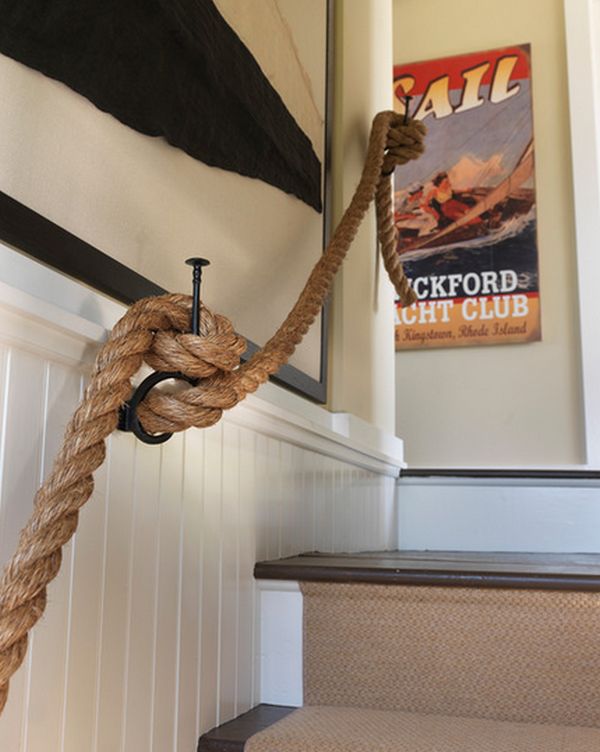
A rope handrail is charming. It’s a nice feature for a beach house or home with a nautical-themed interior design. It has rustic charm and a nice texture you can customize with different knots.
Modern Design Stair Railing
This cool-looking stair railing makes use of leather. You wouldn’t expect to see the material in a stair rail, but looks great. The steel and leather offer a simple and trendy design. From studios CLB Architect and Brandner Design.
Rope Hanging
Including a storage space into the staircase design is smart for a small space. The writer’s cottage, designed by Jarmund/Vigsnæs Arkitekter, is one example. The staircase is a series of cubbies and the railing is made of rope that runs through the stairs and metal loops attached to the ceiling. It’s simple but interesting.
Clean Stair Railing Design
Other materials can create unique and cool designs. Take this modern staircase by Monoloko Design for instance. In addition to a super clean and flat base, it also has a railing design with steel supports at random angles.
Decorative Railing Panels
This staircase, designed by studio FARM, is part of an interior courtyard with trees growing through cutouts in the floor and ceiling. The concrete stairs are concealed behind a decorative railing extending from top to bottom forming a wall. It has a geometric design that allows light through while hiding the staircase.
3D Printed Railing
One of the most interesting and eye-catching staircase railings on our list is from Marc Fornes / Theverymany, together with architect Ammar Eloueini and made from Corian. It has an abstract design, like a web or honeycomb. Its organic-looking structure, which changes shape and appears to become more stretched towards the bottom of the stairs.
Elegant Staircase
Dorrington Architects created an elegant staircase with pattern metal railing. It extends from floor to ceiling, forming a dividing wall and looks like a cathedral. As light passes through, projecting a stylish pattern onto the opposite wall.
Wooden Staircase With Built-in Handrail
Another cool way to make a DIY staircase stand out is by including lighting in its design. That’s what Fraher Architects did. It’s wooded, which adds uniformity and makes the staircase look solid. LED lighting is hidden in the built-in handrails, adding a glow that makes it easier to find the handrail at night.
Floating Wood Stair Case

This floating wood staircase and guardrail was designed by Ming Architects. The staircase features teak wood and stands out as a modern art sculpture piece more than a staircase.
Handrail With Hidden Lighting

Designed by Square Feet Architects this contemporary home includes a wood staircase that’s more user-friendly than other designs. A single hand rail runs along the length of the staircase while balustrades line the other side.
The standout element here is how the handrail has hidden lighting, making it easier to use at night and during low-light situations.
Built-In Stair Handrail

Built-in handrails offer less maintenance as they sit tucked inside the stairwell. A key feature is how the handrails provide more stairwell width space. The design does not have a protruding handrail stretching along the staircase. This feature provides an open passage, making it easier to carry large objects up and down the stairs
Staircase Railing Frequently Asked Questions
What Tools Do I Need To Replace Balusters
When replacing balusters, before you begin, make sure you have the right tools. The most important tool is a reciprocating saw. If you have a handsaw, it will work but be prepared to spend more time than you would like.
Other tools include needle nose pliers, sandpaper, a caulking gun, and a drill.
How To Measure A DIY Stair Rail Project?
Before you begin a DIY stair rail project, you’ll need to make the right measurements before you buy your materials. Measure the nosing from the top landing to the floor at the bottom of your stairs. Once get this measurement, add two feet to it. The number represents the length of the stair rail materials.
Which is better iron or aluminum railings?
This depends on the project. If it’s indoor or outdoor is the most important thing to consider. Wrought iron railings are heavy-duty and handle physical heavy usage, so it would be good for indoor stair railings.
Aluminum railings are good for all outdoor conditions. Unlike iron, aluminum doesn’t rust, so it’s great for outdoor projects. The metal also lasts longer than wrought iron.
How To Switch From Stair Rail To A Handrail?
When switching from a stair rail to a handrail, follow local building codes. The biggest mistake people will make is the top of the horizontal landing handrail, and the top height of the stairway handrail might be different after you’ve switched them. You want to make sure that doesn’t happen.
When home inspectors measure stairwells, they check three things: height, graspability, and baluster spacing. If you violate those you will be fined and it will be harder for you to sell y9our home.
Staircase Railing Conclusion
A staircase railing is a home design feature that deserves attention. It may not seem like it, but your stair rail leaves plenty of room for creativity. With plenty of indoor and outdoor options, you shouldn’t have problems finding something that fits your home and personality.
The post 20 Ingenious Stair Railing Ideas To Spruce Up Your House Design appeared first on Home Decorating Trends - Homedit.



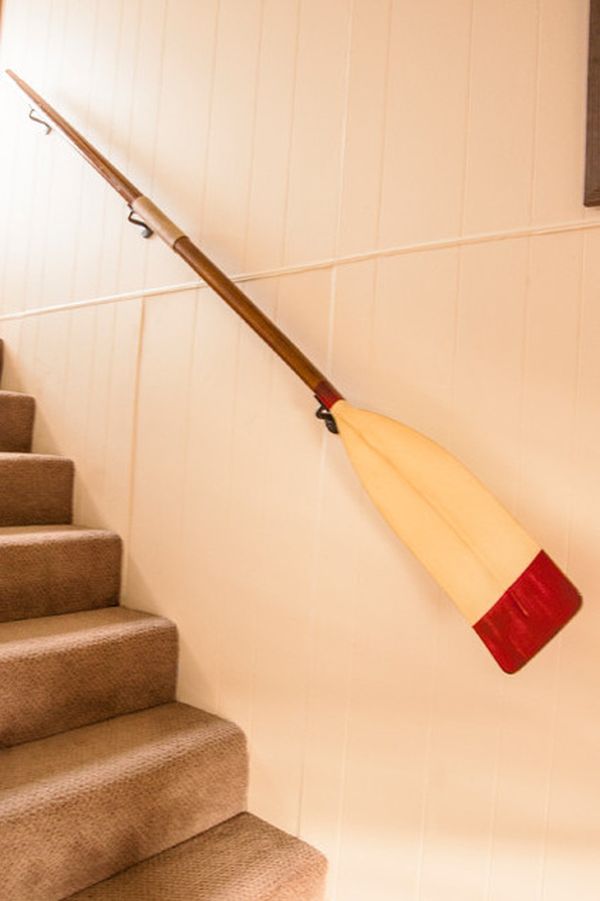

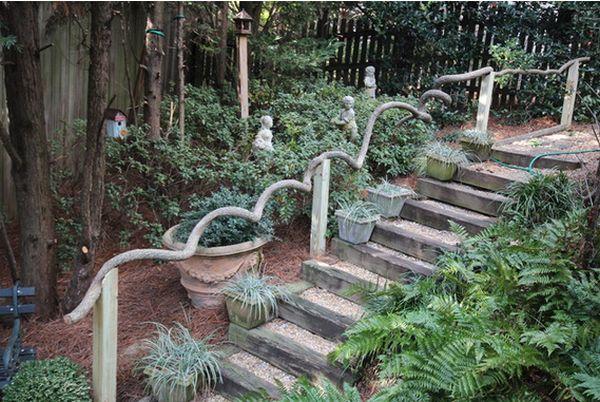

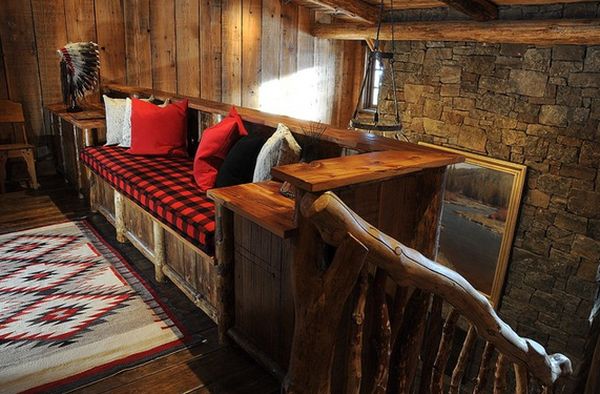
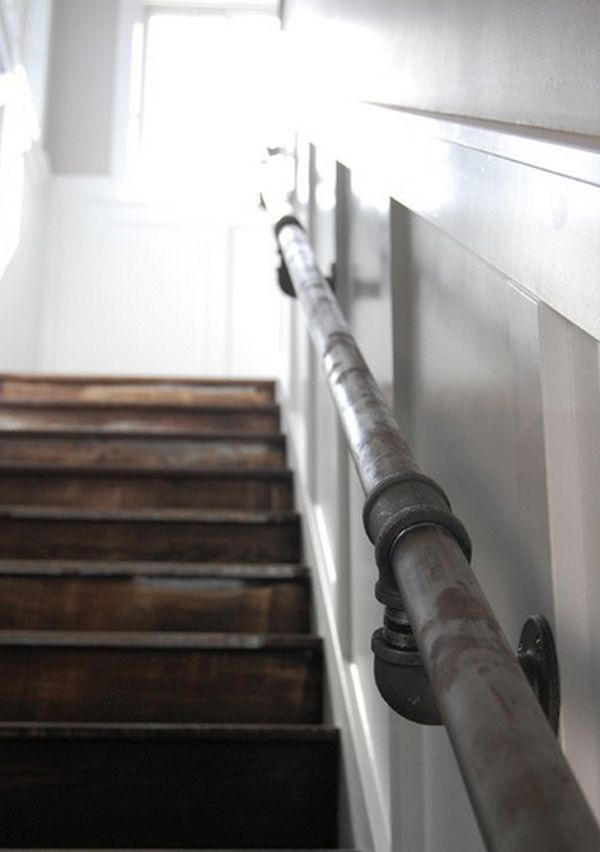







0 Commentaires